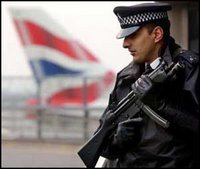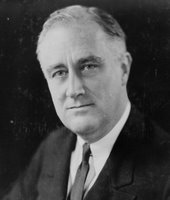The only thing we have to fear...
 Since last Thursday’s revelations that the British authorities had imploded a terrorist plot to blow up US-bound airplanes with liquid-based bombs, the news has offered unending follow-up commentary. Most of the analysis I’ve heard stresses three things:
The first is just how safe we are. The second is that murder is not the terrorists’ objective; murder is only the means. Their objective is to paralyze us with fear. I wrote just a few days ago about the secondary dangers of fear, and how our fear can be, and has been, exploited by others far closer to us, most days, than the terrorists will ever be. It became a cliché, after 9/11, to say that if we give in to fear, then the terrorists win. The cliché, in turn, spawned jokes, my favorite being “If you don’t sleep with me, the terrorists win.” But we have, by and large, as societies, buckled to fear. The result has been irrational reactions to events, striking out at whatever targets seemed convenient, no matter how tangential their connections to the cause of our fears. As I argued the other day, our fear has warped us into supporting courses of action we would otherwise consider immoral.  In response to terrorism, we seem to be thoroughly forgetting the admonishment of Franklin Roosevelt: “The only thing we have to fear is fear itself.” We probably just can't get beyond how trite it sounds. Perhaps when most people hear the phrase, they remember the advice having come, Churchill-like, during the dark days of World War II. So, it is cloaked in the reassuring glory of the Allies eventual victory. That makes it seem distant from our situation, today, in which our fear stems in part from our uncertainty about the eventual outcome. In response to terrorism, we seem to be thoroughly forgetting the admonishment of Franklin Roosevelt: “The only thing we have to fear is fear itself.” We probably just can't get beyond how trite it sounds. Perhaps when most people hear the phrase, they remember the advice having come, Churchill-like, during the dark days of World War II. So, it is cloaked in the reassuring glory of the Allies eventual victory. That makes it seem distant from our situation, today, in which our fear stems in part from our uncertainty about the eventual outcome.But, in fact, Roosevelt wasn’t talking about the Japanese or the Germans. It was only 1933: his first inaugural address. The war was years away, but the fear he was talking about was no less threatening. It was internal: that the future of the United States, as a nation, would disappear in the dust of the Great Depression. It was a fear felt deeply and broadly in the population. The “American way of life” might be defeated forever by an amorphous, barely identifiable enemy against which counter-attack seemed frustratingly elusive. It might sound familiar. In many ways, the fear Roosevelt was admonishing against was even more analogous to our current situation than it would have been had he been talking about Axis enemies. After all, Japan and Germany were nation states whose armies could be attacked and defeated with other armies. But the terrorists’ weapon is our own fear. To defeat them, we must attack two sources: Yes, the amorphous, barely identifiable terrorists, themselves, against whom counter attack will always seem frustratingly elusive. But we also must target our own fears, and those who would fan them. Constantly reminded that the terrorists mean to expunge the “American way of life”, we would do well to recall the rest of FDR’s sentence from which the famous quote is taken: “…let me assert my firm belief that the only thing we have to fear is fear itself -- nameless, unreasoning, unjustified terror which paralyzes needed efforts to convert retreat into advance." Applied to our own era, it turns out this is not just good emotive rhetoric. It’s also both the statistical truth and the strategic key to defeating the terrorists. That is exactly the point delivered in a remarkable piece by Professor John Mueller, “A False Sense of Insecurity?” in the Cato Institute’s journal Regulation. (Hat tip to Boing Boing for the Mueller piece. Reading the piece requires Acrobat Reader.) In it, Mueller neatly contrasts some of John McCain’s words against all the dire predictions and warnings of his contemporaries: “Get on the damn elevator! Fly on the damn plane! Calculate the odds of being harmed by a terrorist. It’s still about as likely as being swept out to sea by a tidal wave. Suck it up, for crying out loud. You’re almost certainly going to be okay. And in the unlikely event you’re not, do you really want to spend your last days cowering behind plastic sheets and duct tape? That’s not a life worth living, is it?” McCain's fire is perhaps the least important thing about Mueller's piece. I read it last Wednesday. Thursday, with the news screaming out of Heathrow, I felt calm.  My online oracle, ZeFrank, felt similarly: My online oracle, ZeFrank, felt similarly:“The way I see it, you can’t have terrorism without terror. … A small number of people can incapacitate a society by leveraging our inability to understand risk.” (Click on Ze's picture to watch his video commentary, "Don't Be Afraid".) I know that all this is a logical appeal against a visceral issue, and that however much railing I might do against the idiocy of the shrieking media banshees – and the politicians’ moves to capitalize on it – it won’t do a damn bit of good. But we either believe we’re smarter than the terrorists, or we believe they’re smarter than us. Which do you believe? Every time we freak out, every time a newscaster plays up the worst-case scenario, every time a politician says we should react based on our fears, we’re just showing that bomb-toting hate merchants are smarter than we are. As Cory Doctorow at BoingBoing put it, amping Mueller’s tempered article: “Only traitors try to make us afraid of terrorists.” .. |






Comments on "The only thing we have to fear..."
post a comment